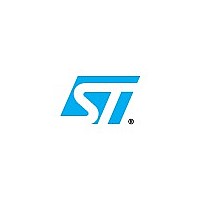ST72321AR6 STMicroelectronics, ST72321AR6 Datasheet - Page 124

ST72321AR6
Manufacturer Part Number
ST72321AR6
Description
8-BIT MCU WITH NESTED INTERRUPTS, FLASH,10-BIT ADC, FIVE TIMERS, SPI, SCI, I2C INTERFACE
Manufacturer
STMicroelectronics
Datasheet
1.ST72321J7.pdf
(193 pages)
Specifications of ST72321AR6
Hdflash Endurance
100 cycles, data retention
Clock Sources
crystal/ceramic resonator oscillators, internal RC oscillator, clock security system and bypass for external clock
Four Power Saving Modes
Halt, Active-Halt,Wait and Slow
Main Clock Controller With
Real time base, Beep and Clock-out capabilities
Two 16-bit Timers With
2 input captures, 2 output compares, external clock input on one timer, PWM and pulse generator modes
8-bit Pwm Auto-reload Timer With
2 input captures, 4 PWM outputs, output compare and time base interrupt, external clock with event detector
- Current page: 124 of 193
- Download datasheet (4Mb)
ST72321Rx ST72321ARx ST72321Jx
I
Bit 1 = M/SL Master/Slave.
This bit is set by hardware as soon as the interface
is in Master mode (writing START=1). It is cleared
by hardware after detecting a Stop condition on
the bus or a loss of arbitration (ARLO=1). It is also
cleared when the interface is disabled (PE=0).
0: Slave mode
1: Master mode
Bit 0 = SB Start bit (Master mode).
This bit is set by hardware as soon as the Start
condition
START=1). An interrupt is generated if ITE=1. It is
cleared by software reading SR1 register followed
by writing the address byte in DR register. It is also
cleared by hardware when the interface is disa-
bled (PE=0).
0: No Start condition
1: Start condition generated
I
Read Only
Reset Value: 0000 0000 (00h)
Bit 7:5 = Reserved. Forced to 0 by hardware.
Bit 4 = AF Acknowledge failure.
This bit is set by hardware when no acknowledge
is returned. An interrupt is generated if ITE=1. It is
cleared by software reading SR2 register or by
hardware when the interface is disabled (PE=0).
The SCL line is not held low while AF=1 but by oth-
er flags (SB or BTF) that are set at the same time.
0: No acknowledge failure
1: Acknowledge failure
Note:
– When an AF event occurs, the SCL line is not
Bit 3 = STOPF Stop detection (Slave mode).
This bit is set by hardware when a Stop condition
is detected on the bus after an acknowledge (if
ACK=1). An interrupt is generated if ITE=1. It is
cleared by software reading SR2 register or by
hardware when the interface is disabled (PE=0).
124/193
2
2
C BUS INTERFACE (Cont’d)
C STATUS REGISTER 2 (SR2)
held low; however, the SDA line can remain low
if the last bits transmitted are all 0. It is then nec-
essary to release both lines by software.
7
0
0
is
0
generated
AF
STOPF ARLO BERR GCAL
(following
a
write
0
The SCL line is not held low while STOPF=1.
0: No Stop condition detected
1: Stop condition detected
Bit 2 = ARLO Arbitration lost.
This bit is set by hardware when the interface los-
es the arbitration of the bus to another master. An
interrupt is generated if ITE=1. It is cleared by soft-
ware reading SR2 register or by hardware when
the interface is disabled (PE=0).
After an ARLO event the interface switches back
automatically to Slave mode (M/SL=0).
The SCL line is not held low while ARLO=1.
0: No arbitration lost detected
1: Arbitration lost detected
Note:
– In a Multimaster environment, when the interface
Bit 1 = BERR Bus error.
This bit is set by hardware when the interface de-
tects a misplaced Start or Stop condition. An inter-
rupt is generated if ITE=1. It is cleared by software
reading SR2 register or by hardware when the in-
terface is disabled (PE=0).
The SCL line is not held low while BERR=1.
0: No misplaced Start or Stop condition
1: Misplaced Start or Stop condition
Note:
– If a Bus Error occurs, a Stop or a repeated Start
Bit 0 = GCAL General Call (Slave mode).
This bit is set by hardware when a general call ad-
dress is detected on the bus while ENGC=1. It is
cleared by hardware detecting a Stop condition
(STOPF=1) or when the interface is disabled
(PE=0).
0: No general call address detected on bus
1: general call address detected on bus
is configured in Master Receive mode it does not
perform arbitration during the reception of the
Acknowledge Bit. Mishandling of the ARLO bit
from the I2CSR2 register may occur when a sec-
ond master simultaneously requests the same
data from the same slave and the I
does not acknowledge the data. The ARLO bit is
then left at 0 instead of being set.
condition should be generated by the Master to
re-synchronize communication, get the transmis-
sion acknowledged and the bus released for fur-
ther communication
2
C master
Related parts for ST72321AR6
Image
Part Number
Description
Manufacturer
Datasheet
Request
R

Part Number:
Description:
STMicroelectronics [RIPPLE-CARRY BINARY COUNTER/DIVIDERS]
Manufacturer:
STMicroelectronics
Datasheet:

Part Number:
Description:
STMicroelectronics [LIQUID-CRYSTAL DISPLAY DRIVERS]
Manufacturer:
STMicroelectronics
Datasheet:

Part Number:
Description:
BOARD EVAL FOR MEMS SENSORS
Manufacturer:
STMicroelectronics
Datasheet:

Part Number:
Description:
NPN TRANSISTOR POWER MODULE
Manufacturer:
STMicroelectronics
Datasheet:

Part Number:
Description:
TURBOSWITCH ULTRA-FAST HIGH VOLTAGE DIODE
Manufacturer:
STMicroelectronics
Datasheet:

Part Number:
Description:
Manufacturer:
STMicroelectronics
Datasheet:

Part Number:
Description:
DIODE / SCR MODULE
Manufacturer:
STMicroelectronics
Datasheet:

Part Number:
Description:
DIODE / SCR MODULE
Manufacturer:
STMicroelectronics
Datasheet:

Part Number:
Description:
Search -----> STE16N100
Manufacturer:
STMicroelectronics
Datasheet:

Part Number:
Description:
Search ---> STE53NA50
Manufacturer:
STMicroelectronics
Datasheet:

Part Number:
Description:
NPN Transistor Power Module
Manufacturer:
STMicroelectronics
Datasheet:

Part Number:
Description:
DIODE / SCR MODULE
Manufacturer:
STMicroelectronics
Datasheet:










